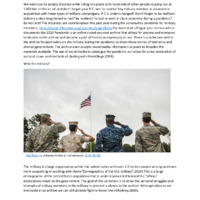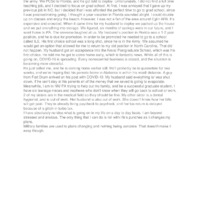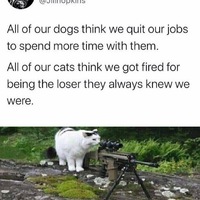Item
Charlene Goins Oral History, 2020/07/21
Title (Dublin Core)
Charlene Goins Oral History, 2020/07/21
Description (Dublin Core)
This is an interview Charlene Goins discusses her experience during this time. Many military families have noticed a difference in the personal experiences and what the "official" military stance is. Charlene also discusses the financial hardships military families are placed in during PCS season, where service members are required to move to a new duty station.
Recording Date (Dublin Core)
Creator (Dublin Core)
Contributor (Dublin Core)
Event Identifier (Dublin Core)
Partner (Dublin Core)
Type (Dublin Core)
voice recording
Controlled Vocabulary (Dublin Core)
Curator's Tags (Omeka Classic)
Collection (Dublin Core)
Linked Data (Dublin Core)
Curatorial Notes (Dublin Core)
Date Submitted (Dublin Core)
07/28/2020
Date Modified (Dublin Core)
10/21/2020
03/01/2021
04/15/2021
04/16/2021
05/18/2022
10/21/2022
08/02/2022
09/30/2024
Interviewer (Bibliographic Ontology)
Alexis Walker
Interviewee (Bibliographic Ontology)
Charlene Goins
Location (Omeka Classic)
Newport News
Virginia
United States of America
Language (Dublin Core)
English
Duration (Omeka Classic)
00:06:00
abstract (Bibliographic Ontology)
This is an interview Charlene Goins discusses her experience during this time. Many military families have noticed a difference in the personal experiences and what the "official" military stance is. Charlene also discusses the financial hardships military families are placed in during PCS season, where service members are required to move to a new duty station.
Transcription (Omeka Classic)
Alexis Walker 00:00
Okay, so can you state your name and the time and the date?
Charlene Goins 00:07
My name is Charlene Goins it is 8:29pm on July 21 2020.
Alexis Walker 00:15
Okay, and where do you currently live?
Charlene Goins 00:19
Newport News, Virginia.
Alexis Walker 00:21
And what is your profession?
Charlene Goins 00:27
I'm a stay at home mom.
Alexis Walker 00:30
Are you currently married? And if so, what is your spouse's profession?
Charlene Goins 00:34
Yes, he is an active duty soldier in the US Army.
Alexis Walker 00:38
And who is your household composed of?
Charlene Goins 00:41
Myself, my husband, and my five month old daughter.
Alexis Walker 00:46
And your dogs
Charlene Goins 00:47
And two dogs.
Alexis Walker 00:49
When did you first become aware of COVID-19?
Charlene Goins 00:54
The beginning of March 2019 or 20-2020.
Alexis Walker 01:00
Okay, and what were your initial thoughts about it?
Charlene Goins 01:07
Honestly, I didn't really think it was that big of a deal. I thought it was nerve wracking because it was a new disease we didn't know. But I didn't think it would last as long as it has.
Alexis Walker 01:22
Okay, and have your thoughts or feelings changed since then?
Charlene Goins 01:25
Yes. I think it's definitely something that we should be taking more seriously and abiding more precautions in place. But unfortunately that does not seem to be happening.
Alexis Walker 01:39
Okay. Has the Coronavirus affected your day to day activities? And if so, can you describe how?
Charlene Goins 01:47
Yes. So we definitely spend more time indoors and at home than we were before. I'm really cautious about where I go. Because I have a five month old was born just the beginning of 2020 We don't really go to the park or go on walks or anything because you never know who's going to be around and who's sick with what.
Alexis Walker 02:15
Okay, then we're gonna move on to how being associated with the military has affected you. How has your association with the military affected your view on the Coronavirus?
Charlene Goins 02:29
I don't really think it's affected too much. What I think other than the fact that the military seems to be the last one to respond actually taking it serious.
Alexis Walker 02:41
Okay, then and how did your base Institute policy changes due to the Coronavirus?
Charlene Goins 02:47
So our base went on a Bravo lockdown, and then a Charlie lock down. So before it had more laxed openings and let visitors still come and then all of a sudden stop no visitors you had to have a DOD card. And then you were only allowed to shop certain days of the week at the commissary the PX. And you had different time constraints and way more checkpoints throughout base.
Alexis Walker 03:12
And you were in Colorado Springs at this time, right?
Charlene Goins 03:14
Yes.
Alexis Walker 03:15
Okay, how quickly did your base institute these changes?
Charlene Goins 03:17
Oh, It probably took like a month before they actually did anything.
Alexis Walker 03:26
Okay. How do you think the military has handled the current Coronavirus situation?
Charlene Goins 03:32
Not that well. It's put a lot of people in hardships because of the middle of PCS season this summer. So people have spent months either in hotels or completely without any of their home goods. And you can't get an answer until about two weeks before you're supposed to leave. They're like, Oh, okay, you're gonna go again. We're not holding you up anymore. So a lot of families are displaced, and a lot of people are getting into serious debt.
Alexis Walker 03:59
Okay, and how has your family been affected by the military regulations during the pandemic specifically?
Charlene Goins 04:05
We originally thought because of the pandemic, we would not be doing a cross country move. And then we were given less than 30 day notice that we would be moving then it took exceptional measures in order to secure housing and to be able to safely move cross country with a baby and two dogs and limited resources or help from the military.
Alexis Walker 04:29
Okay, how do you experience, have you experienced the difference between your personal feelings and the military regulate-regulations for the Coronavirus? What the military saying to do versus how you personally feel you should act?
Charlene Goins 04:40
Yes. We noticed at first the military was not considering family and factors and individual situations for who would be a risk. Thankfully, my husbands specific unit went further into action and made sure that men where and women who are serving that had brand new children at home, or pregnant spouses, they were not going to work and being exposed, but we definitely didn't feel like they were taking enough account to protecting everybody that was working. They still held like a group Easter dinner, and come to find out seven people who were tested positive from being at that party. And my husband included was there.
Alexis Walker 05:26
Okay, last question. How do you think your military association has changed how you've experienced the pandemic?
Charlene Goins 05:33
I think that because my husband's been serving in the military. We are not as concerned about continuing to pay our bills, thankfully, because he will still get his paycheck. But we are at a difference as far as I feel like we're the last people that they consider of how this is affecting, and we're just kind of thrown through the loop no matter what, and we're just told to suck it up.
Alexis Walker 05:56
Okay, okay, then. Well, thank you for your time.
Okay, so can you state your name and the time and the date?
Charlene Goins 00:07
My name is Charlene Goins it is 8:29pm on July 21 2020.
Alexis Walker 00:15
Okay, and where do you currently live?
Charlene Goins 00:19
Newport News, Virginia.
Alexis Walker 00:21
And what is your profession?
Charlene Goins 00:27
I'm a stay at home mom.
Alexis Walker 00:30
Are you currently married? And if so, what is your spouse's profession?
Charlene Goins 00:34
Yes, he is an active duty soldier in the US Army.
Alexis Walker 00:38
And who is your household composed of?
Charlene Goins 00:41
Myself, my husband, and my five month old daughter.
Alexis Walker 00:46
And your dogs
Charlene Goins 00:47
And two dogs.
Alexis Walker 00:49
When did you first become aware of COVID-19?
Charlene Goins 00:54
The beginning of March 2019 or 20-2020.
Alexis Walker 01:00
Okay, and what were your initial thoughts about it?
Charlene Goins 01:07
Honestly, I didn't really think it was that big of a deal. I thought it was nerve wracking because it was a new disease we didn't know. But I didn't think it would last as long as it has.
Alexis Walker 01:22
Okay, and have your thoughts or feelings changed since then?
Charlene Goins 01:25
Yes. I think it's definitely something that we should be taking more seriously and abiding more precautions in place. But unfortunately that does not seem to be happening.
Alexis Walker 01:39
Okay. Has the Coronavirus affected your day to day activities? And if so, can you describe how?
Charlene Goins 01:47
Yes. So we definitely spend more time indoors and at home than we were before. I'm really cautious about where I go. Because I have a five month old was born just the beginning of 2020 We don't really go to the park or go on walks or anything because you never know who's going to be around and who's sick with what.
Alexis Walker 02:15
Okay, then we're gonna move on to how being associated with the military has affected you. How has your association with the military affected your view on the Coronavirus?
Charlene Goins 02:29
I don't really think it's affected too much. What I think other than the fact that the military seems to be the last one to respond actually taking it serious.
Alexis Walker 02:41
Okay, then and how did your base Institute policy changes due to the Coronavirus?
Charlene Goins 02:47
So our base went on a Bravo lockdown, and then a Charlie lock down. So before it had more laxed openings and let visitors still come and then all of a sudden stop no visitors you had to have a DOD card. And then you were only allowed to shop certain days of the week at the commissary the PX. And you had different time constraints and way more checkpoints throughout base.
Alexis Walker 03:12
And you were in Colorado Springs at this time, right?
Charlene Goins 03:14
Yes.
Alexis Walker 03:15
Okay, how quickly did your base institute these changes?
Charlene Goins 03:17
Oh, It probably took like a month before they actually did anything.
Alexis Walker 03:26
Okay. How do you think the military has handled the current Coronavirus situation?
Charlene Goins 03:32
Not that well. It's put a lot of people in hardships because of the middle of PCS season this summer. So people have spent months either in hotels or completely without any of their home goods. And you can't get an answer until about two weeks before you're supposed to leave. They're like, Oh, okay, you're gonna go again. We're not holding you up anymore. So a lot of families are displaced, and a lot of people are getting into serious debt.
Alexis Walker 03:59
Okay, and how has your family been affected by the military regulations during the pandemic specifically?
Charlene Goins 04:05
We originally thought because of the pandemic, we would not be doing a cross country move. And then we were given less than 30 day notice that we would be moving then it took exceptional measures in order to secure housing and to be able to safely move cross country with a baby and two dogs and limited resources or help from the military.
Alexis Walker 04:29
Okay, how do you experience, have you experienced the difference between your personal feelings and the military regulate-regulations for the Coronavirus? What the military saying to do versus how you personally feel you should act?
Charlene Goins 04:40
Yes. We noticed at first the military was not considering family and factors and individual situations for who would be a risk. Thankfully, my husbands specific unit went further into action and made sure that men where and women who are serving that had brand new children at home, or pregnant spouses, they were not going to work and being exposed, but we definitely didn't feel like they were taking enough account to protecting everybody that was working. They still held like a group Easter dinner, and come to find out seven people who were tested positive from being at that party. And my husband included was there.
Alexis Walker 05:26
Okay, last question. How do you think your military association has changed how you've experienced the pandemic?
Charlene Goins 05:33
I think that because my husband's been serving in the military. We are not as concerned about continuing to pay our bills, thankfully, because he will still get his paycheck. But we are at a difference as far as I feel like we're the last people that they consider of how this is affecting, and we're just kind of thrown through the loop no matter what, and we're just told to suck it up.
Alexis Walker 05:56
Okay, okay, then. Well, thank you for your time.
Linked resources
Filter by property
| Title | Alternate label | Class |
|---|---|---|
 Portfolio of an intern of the Journal of a plague year archive Portfolio of an intern of the Journal of a plague year archive |
Linked Data | Interactive Resource |
 A Military Family A Military Family |
Linked Data | Text |
This item was submitted on July 28, 2020 by Alexis Walker using the form “Share Your Story” on the site “A Journal of the Plague Year”: https://covid-19archive.org/s/archive
Click here to view the collected data.


